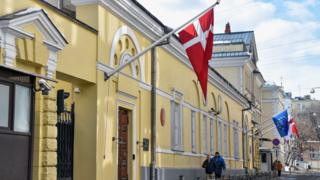Spy poisoning: Russia expels 'unfriendly' Western diplomats
 Image copyright
AFP
Image copyright
AFP
Russia has ordered the expulsion of more diplomats from Western countries in a tit-for-tat response over the poisoning of an ex-spy in the UK.
Ambassadors were called in to be told of the measure a day after Russia kicked out 60 US diplomats and closed the St Petersburg consulate.
The move comes after the UK blamed Russia for the nerve agent attack on Sergei Skripal and his daughter Yulia in Salisbury, in England, on 4 March.
Russia denies any role in the incident.
Mr Skripal remains in a critical but stable condition. Yulia's condition is said to be improving.
- How big is the Kremlin's diplomatic network?
- What the diplomat expulsions tell us
- What next for Russia’s spy networks?
- Full coverage of the Russia spy poisoning
UN Secretary General Antonio Guterres warned on Thursday that the world risked "coming to a situation that is similar, to a large extent, to what we lived during the Cold War".
Who is being ordered out?
Twenty-nine countries have expelled 145 Russian officials in solidarity with the UK - and Nato has also ordered 10 Russians out of its mission in Belgium.
The US expelled the largest single number - 60 diplomats - and closed the Russian consulate general in Seattle.
Russia reciprocated on Thursday declaring 58 US diplomats in Moscow and two in the city of Yekaterinburg to be "personae non gratae".
The US said it had been expecting the move and warned it may take further action.
On Friday, Western ambassadors from the countries that had expelled Russians were called in to be told of Moscow's retaliation.
As details of new expulsions emerged, the UK was told it would have to reduce its staffing in Russia to the same number of Russians in the UK. Both countries have already expelled 23 staff.
What is Russia's argument?
Russian Foreign Minister Sergei Lavrov has blamed "harsh pressure from the United States and Britain under the pretext of the so-called Skripal case".
He reiterated Russian calls for consular access to Yulia Skripal - a Russian citizen.
Russia, he said, was also seeking a meeting with leaders of the Organisation for the Prohibition of Chemical Weapons (OPCW) to "establish the truth".
- Sergei Skripal: Who is the former Russian colonel?
- What was the Cold War?
- Russian spy: The story so far
What do we know about the nerve agent?
Britain says the chemical used in the attack was part of a group of nerve agents developed by the Soviet Union known as Novichok.
OPCW has sent a team to the UK to investigate samples of the agent Britain says was used.
The results are expected to take a minimum of two weeks, the government says.
Police say the Skripals first came into contact with the nerve agent at Mr Skripal's home in Salisbury, with the highest concentration found on the front door.
Following the incident in Salisbury, British Prime Minister Theresa May announced a series of sanctions, including the expulsion of 23 Russian diplomats alleged to be intelligence agents.
The Kremlin responded by expelling an equal number of UK diplomats and closing the country's British Council.
UK National Security Adviser Mark Sedwill, speaking in Washington on Thursday, said expulsions by Western countries were aimed at rooting out covert Russian intelligence networks.